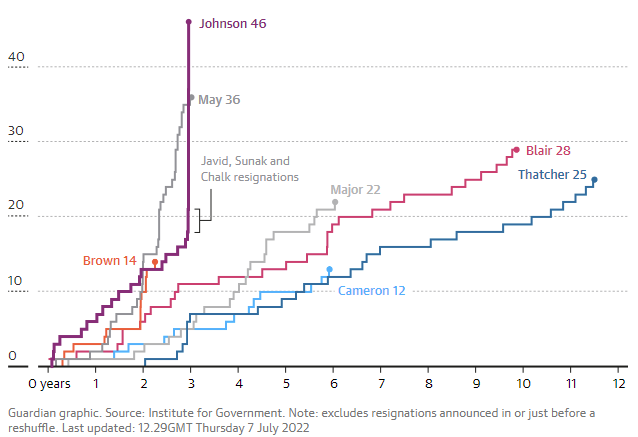Bad numbers for Boris
Resignations, inflation, and scandalous parties: Johnson’s resignation in a nutshell. (Photo: Guardian)
Two weeks ago, Boris Johnson officially announced his resignation as the United Kingdom’s prime minister, putting an end to his controversy-laden three-year term.
Though his replacement likely won’t take office until September, most Brits seem to be happy to see him gone—and considering his track record, that’s not surprising at all. Aside from rivaling Donald Trump as the most meme-able world leader, Johnson’s term has been riddled with piles upon piles of scandals, plummeting public approval, and skyrocketing ministerial resignations.
Under Johnson’s leadership, the British parliament saw the highest number of ministerial resignations. A record number of almost 60 members of Johnson’s government have quit, with 28 of those departing in early July, just before Johnson announced his resignation.
Astoundingly, Johnson’s term saw even more resignations than that of Theresa May, under whom 43 ministers resigned after she failed to secure a compromise on her Brexit deal.
Under Johnson’s watch, inflation rose to a 40-year high, while growth forecasts for the UK were the lowest among advanced economies except for Russia—although, according to Johnson the UK has “[...] The fastest growing economy in the G7.”
This statement is not true at all. While the UK did experience a slight bump when the economy grew by 6.8% between the third quarter of 2020 and the third quarter of 2021, which was better than the other G7 countries, their GDP shrank by almost 10% in 2020.
Moreover, data from the Organisation for Economic Co-operation and Development predicts that the British economy will grow by 3.6% this year, and 0% next year. This means that Johnson is either lying, or just plain wrong, because the truth is that the UK is projected to have the slowest growing economy in the G7 in 2023.
Leaving through the Partygate
We haven’t even talked about the cherry on top of Johnson’s three-year nightmare term, Partygate. On days when the UK recorded hundreds of COVID deaths and at a time when COVID restrictions were in place, Johnson and chancellor Rishi Sunak, were having parties in No. 10 Downing St., the prime minister’s official residence.
Johnson attended at least six of the 12 events that were investigated, causing him to be fined by the Metropolitan police and making him the first prime minister to be charged with a crime while in office.
In light of all of this (and more), approval ratings for Johnson look abysmal. The latest poll from Ipsos Mori shows that Johnson is leaving with a net satisfaction rating of -44, about the same as his predecessor, Theresa May. Johnson is also now leaving with one of the shortest single tenures as prime minister since 1900, having served only 1,079 days by the time of his resignation.
Johnson became prime minister in 2019, with the promise that he would “Get Brexit done.” After three years of scandals and missteps, the promises of Brexit have yet to materialize, and Brits are left with more questions than answers as Johnson’s resignation leaves a mountain of problems for the next PM to solve.
But I guess, as Johnson said in his laughably chill resignation speech, them’s the breaks.



